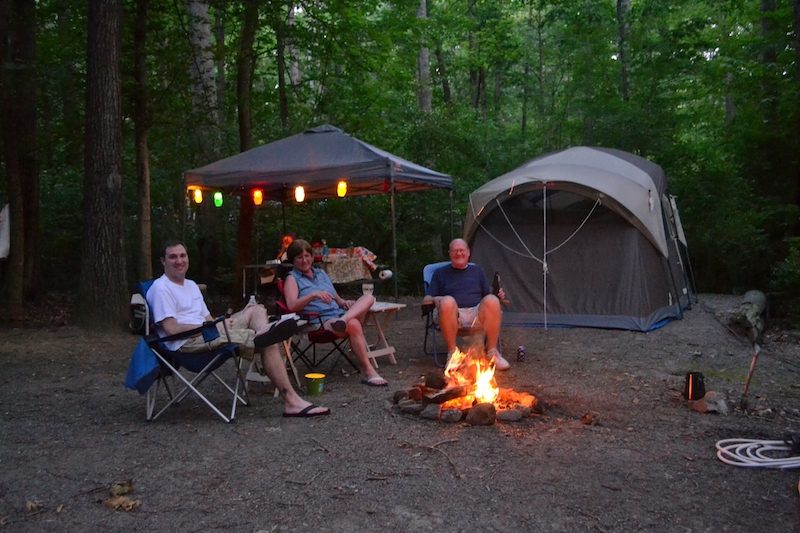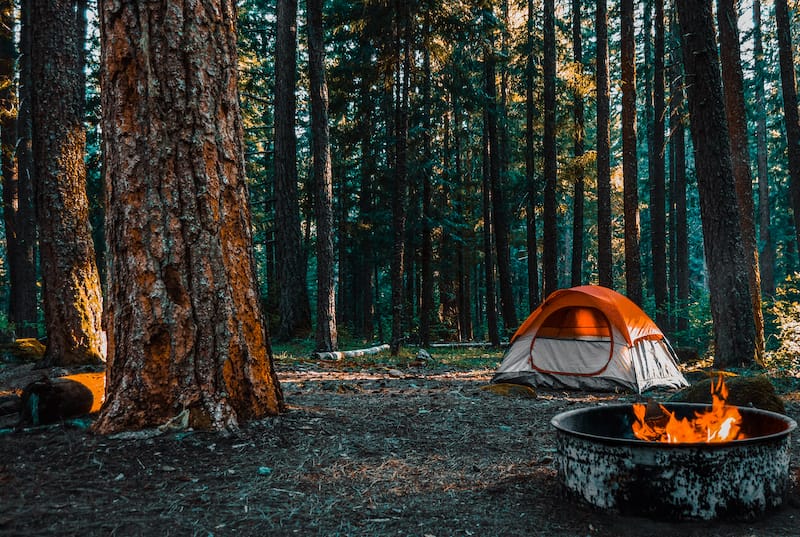Sports play an essential role in promoting physical health, mental well-being, and social interaction. Whether you prefer indoor or outdoor activities, engaging in sports provides numerous benefits and opportunities for personal growth and enjoyment.Indoor sports refer to activities that are conducted within an enclosed space, such as Walking Pad,gyms, leisure centers, or sports halls. These sports offer a controlled environment with regulated conditions, making them suitable for year-round participation. Outdoor sports, on the other hand, are played in open-air environments, such as parks, fields, or natural landscapes. These sports provide a connection to nature and offer unique challenges that can add excitement to the sporting experience. Let’s explore the advantages of outdoor sports!

I. Introduction to Tent Camping in Virginia
A. Overview of the Natural Beauty and Outdoor Opportunities in Virginia
Virginia is known for its natural beauty, with diverse landscapes that include mountains, forests, rivers, and coastal areas. The state offers numerous opportunities for outdoor activities, making it an ideal destination for tent camping.
B. Understanding the Appeal and Benefits of Tent Camping in the State
Tent camping allows visitors to immerse themselves in Virginia’s natural surroundings and experience the tranquility of the outdoors. It provides an opportunity to disconnect from daily routines, connect with nature, and create lasting memories with friends and family.
C. Exploring the Diversity of Campgrounds and Scenic Locations in Virginia
From scenic mountain vistas in Shenandoah National Park to picturesque coastal sites along the Chesapeake Bay, Virginia offers a wide range of campgrounds and scenic locations. These diverse environments cater to various preferences, providing options for every type of camper.
II. Choosing the Perfect Campground in Virginia
A. State and National Parks

- Exploring Virginia’s State and National Parks for Tent Camping
Virginia is home to several state and national parks that offer tent camping opportunities. Shenandoah National Park, Grayson Highlands State Park, and First Landing State Park are just a few examples of the scenic locations available for camping.
- Highlighting the Natural Splendor and Amenities Offered
State and national parks provide access to hiking trails, wildlife viewing, and breathtaking landscapes. Many parks also offer amenities such as restrooms, picnic areas, and interpretive programs to enhance the camping experience.
B. Private Campgrounds and Resorts
- Identifying Private Campgrounds and Resorts in Virginia
Private campgrounds and resorts are available throughout Virginia and often offer additional amenities such as swimming pools, playgrounds, and recreational facilities. Examples include KOA campgrounds and RV resorts.
- Exploring the Additional Amenities and Services Available
Private campgrounds and resorts may offer amenities such as Wi-Fi, laundry facilities, camp stores, and organized activities. Some locations also provide rental equipment or have cabins available for those who prefer a more comfortable camping experience.
III. Planning Your Tent Camping Trip in Virginia
A. Researching Campground Facilities and Reservations
- Exploring Campground Amenities, Availability, and Booking Procedures
Research the amenities offered at campgrounds, such as water and electric hookups, showers, and dump stations. Check availability and make reservations in advance, especially during peak camping seasons.
- Highlighting Tips for Securing Campsite Reservations in Popular Areas
To secure a campsite in popular areas, book well in advance and consider visiting during weekdays or off-peak seasons. Some campgrounds offer first-come, first-served sites, but it’s best to arrive early to secure a spot.
B. Packing Essentials and Outdoor Gear

- Identifying Essential Camping Gear and Supplies for a Virginia Adventure
Essential camping gear includes a tent, sleeping bags, cooking supplies, food, water, and appropriate clothing for the season. Don’t forget items such as bug spray, sunscreen, and a first aid kit.
- Exploring Tips for Preparing and Organizing Your Camping Equipment
Prepare and organize your camping equipment by creating a checklist, packing items in waterproof bags, and labeling containers for easy access. Familiarize yourself with equipment setup and maintenance procedures before your trip.
IV. Exploring Outdoor Activities in Virginia
A. Hiking and Backpacking Trails
- Highlighting Popular Hiking and Backpacking Trails in Virginia
Virginia offers a variety of hiking and backpacking trails, including the Appalachian Trail, McAfee Knob, and Old Rag Mountain. These trails provide opportunities to explore the state’s natural beauty and challenge yourself physically.
- Exploring Scenic Routes and Trail Difficulty Levels
Research the difficulty level and length of trails to choose routes that match your fitness level and preferences. Be prepared with appropriate footwear, maps, and navigation tools when embarking on a hiking or backpacking adventure.
B. Water Activities and Beach Camping

- Identifying Waterways, Lakes, and Coastal Areas for Water Activities
Virginia has numerous waterways, lakes, and coastal areas for water activities such as fishing, kayaking, and swimming. Locations like Smith Mountain Lake, the James River, and the Virginia Beach coastline provide opportunities for beach camping and fun on the water.
- Exploring Beach Camping Opportunities in Virginia
Virginia offers beach camping at locations such as False Cape State Park and Chincoteague National Wildlife Refuge. Check regulations and permits required for beach camping and plan accordingly.
V. Wildlife and Nature Viewing in Virginia
A. Wildlife Habitats and Preserves
- Exploring Wildlife Habitats and Preserves in Virginia
Virginia is home to diverse wildlife habitats and preserves, including Great Dismal Swamp National Wildlife Refuge, Back Bay National Wildlife Refuge, and Shenandoah National Park. These locations provide opportunities for birdwatching and wildlife observation.
- Highlighting Opportunities for Birdwatching and Wildlife Observation
Bring binoculars and field guides to identify birds and wildlife in their natural habitats. Respect the animals’ space and observe without disturbing their behavior.
B. Nature and Interpretive Centers
- Identifying Nature and Interpretive Centers for Educational Experiences
Nature and interpretive centers, such as the Virginia Living Museum and the Virginia Aquarium, offer educational experiences for nature enthusiasts. Learn about local flora and fauna, attend interactive programs, and participate in guided tours.
- Exploring Guided Tours and Programs for Nature Enthusiasts
Check the schedules of nature centers and parks for guided tours, workshops, and educational programs. These activities provide opportunities to learn more about the natural history and ecology of Virginia.
VI. Camping Safety and Leave No Trace Principles

A. Safety Guidelines for Tent Camping in Virginia
- Exploring Safety Practices for Fire Safety, Wildlife Encounters, and Emergencies
Follow fire safety protocols, keep a safe distance from wildlife, and be prepared for emergencies by carrying a first aid kit and knowing the park’s emergency procedures. Check weather forecasts and be aware of potential hazards.
- Highlighting Tips for Camping Responsibly to Ensure Personal Safety
Camp responsibly by following campground regulations, properly disposing of waste, and respecting wildlife. Keep food stored securely to prevent attracting animals. Be mindful of noise levels and respect other campers’ privacy.
B. Leave No Trace Principles in Virginia Campgrounds
- Identifying Leave No Trace Principles for Minimizing Environmental Impact
Adhere to Leave No Trace principles by packing out all trash, disposing of waste properly, and leaving natural features as you found them. Minimize your impact on the environment to preserve Virginia’s natural beauty.
- Exploring Tips for Practicing Responsible Outdoor Ethics in Virginia
Camp responsibly by using designated campsites, keeping a safe distance from fragile flora and fauna, and avoiding unnecessary disturbance. Educate yourself about local regulations and guidelines to minimize your impact on the environment.
Tent camping in Virginia offers the opportunity to immerse yourself in the state’s natural beauty and experience memorable outdoor adventures. By choosing the perfect campground, planning your trip, and exploring various outdoor activities, you can create a fulfilling camping experience. Understanding camping safety guidelines and practicing Leave No Trace principles ensure a responsible and environmentally-friendly camping trip. Embrace the charm and splendors of tent camping in Virginia and create lifelong memories in the great outdoors.
